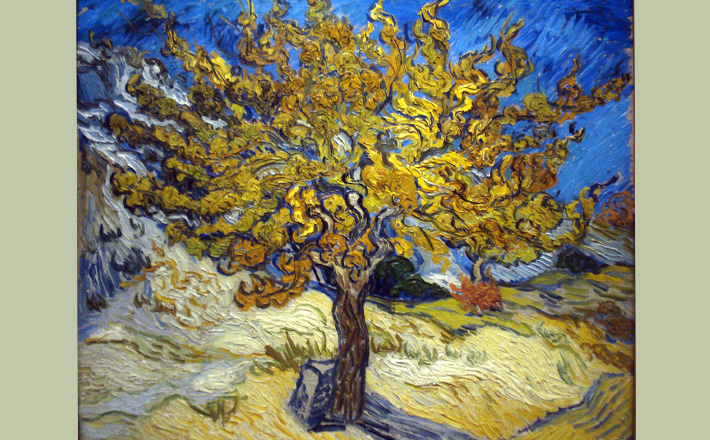Commentary on Psalm 37:1-9
Written as an acrostic poem, approximately every other line in Psalm 37 begins with a successive letter of the twenty-two letter Hebrew alphabet.
This can even be seen in the English translation of the NRSV since the editors chose to divide each “stanza” of the forty total verses by a blank space.[1] It is unclear why the ancient poets sometimes employed the artifice of the acrostic. It may have been a matter of aesthetics, a mnemonic aid, or, perhaps, the intention was to signal that the subject matter of the poem was treated from beginning to end, or from “A to Z.”
The lectionary selection takes us only part way through the first five letters of the acrostic. Nevertheless, the main themes of the larger poem are included in the verses before us.
Like aspects of wisdom literature (which this psalm resembles) there are hortatory elements throughout. The narrator is a venerable elder (verse 25) who, having seen much in life (verses 35-6), urges those who have less experience not to be agitated at the apparent success of the wicked, nor be envious of wrongdoers.[2] The NRSV’s translation “do not fret because the wicked” is a way of rendering the Hebrew root harah, a verb that connotes heat or becoming inflamed with anger. The NJB’s “Do not get heated about the wicked” is more literal. The JPS translation of “vexed” also succeeds in signaling the angry indignation against which the poet cautions. The same verb appears again in verses 7 and 8.
Why should one not fret over the wicked? The psalmist says that expending emotional energy in that way is not worth the effort because the success of the wicked is transient. They will soon enough fade like grass and wither like the green herb. The same rationale is still in effect in verses 7 to 9, as well as in verses 10, 20, and especially in verses 35-36. In verses 7 to 9, however, the psalmist urges calm patience and trust in the LORD because, he avers, the LORD will inevitably act. The wicked will be “cut off.”
The notion that the wicked will be “cut off” or destroyed is a frequent theme in the Scriptures.[3] Proverbs 2:21-22, however, provides a particularly interesting example:
“For the upright will abide in the land,
and the innocent will remain in it;
but the wicked will be cut off from the land,
and the treacherous will be rooted out of it.”
The consequence of patient trust and fidelity is the occupation of the land and the security of a home. The wicked, in contrast, will be dispossessed of the land. Precisely this notion appears in Psalm 37:9 — the wicked will be cut off [from the land] while those who wait on the LORD shall inherit it. Indeed, the idea of land possession appears several times in the psalm.
Verse 3 declares that trust in the LORD and well doing results in occupation of the land. Verse 11 announces that the meek shall inherit the land and the prosperity that attends that legacy. Verse 22 restates the claim of verse 9: “for those blessed by the LORD shall inherit the land, but those cursed by him shall be cut off. “ Verses 29 and 34 return again to the theme. Present appearances notwithstanding, the righteous will enjoy the inheritance of land and, significantly, the security that comes with it (see verses 3, 28b-29).
Rather than rage against the wicked, the psalmist urges action of another sort. Indeed, he directs the listener to act, and to act with series of imperative verbs. Each verb or verb pair is accompanied by its own explicit promise:
Verse 3: Trust in the LORD and do good for that leads to land and security.
Verse 4: Take delight in the LORD for the LORD will give the desires of your heart.
Verse 5: Commit your way and trust the LORD for LORD will act and vindicate (verse 6).
Verses 7 to 9 direct the reader to be still and wait patiently, not fretting over wrongdoers, to refrain from anger, forsake wrath and (again) to not fret because anger, wrath, and vexation lead to evil. The wicked will receive their comeuppance from the LORD and those who wait will enjoy the rewards of land (verses 9, 11) and prosperity (verse 11b).
Multiple problems present themselves in crafting a sermon on this text. For one thing, it would be quite easy for the message of this psalm to be translated into a dangerous quietism that assumes that any who suffer injustice or oppression — or any who witness the same — should wait passively until the sweet by and by when the Lord sets all things in proper order. It doubtless is sage counsel not to be overwhelmed with angry indignation and, instead, to commit oneself to an attitude of trust and delight in God. Any cardiologist will confirm that angry agitation is an unhealthy default mood.
An attitude of quiet trust is surely a better option for daily life. But such an attitude does not equate to quietism. The admonition to “be still” in verse 7 does not mean to remain inert. The verb also appears in contexts where it means to be made motionless in amazement and fear.[4] That such should be the understanding here is confirmed by the charge to “wait patiently” that appears in the same line.
An unusual hithpolel form of the verb hul, the verb here translated “wait patiently” actually connotes an internal writhing. Together the two verbs are set in opposition to the futile anxious vexation of verse 7b. If anyone should fret, it should be in anticipation of the LORD’s action. Perhaps this interpretation undergirds the Septuagint’s rendering of the phrase: “Be subject to the LORD and beseech him” (author’s translation).
A more significant problem in preaching this text is that we live in an age that doesn’t much believe it’s message. For example, North Americans have much cause to be deeply suspicious of a psalm that confidently declares the doom of those heading financial systems that are decidedly tilted to further the gap between the turbo-wealthy and the shrinking middle-class, not to mention the gap between the one percent and the destitute poor.
Politicians of every stripe seem unwilling or unable to precipitate actual change while protesters occupying public parks find themselves arrested and sent packing. Against this, can we believe that the wicked “will soon fade like grass” (verse 2)? Or that, if we but trust, then God will act (verse 5)? Can we be expected to take seriously that the wicked will be cut off (verse 9) or that the “Lord laughs at the wicked, for he sees that their day is coming” (verse 13)?
Yes. Yes we can believe it. And, indeed this word, this message, may be precisely the word we need to hear. The poet acknowledges that the wicked may have the upper hand now. Evildoers do prosper. And many of them are shamelessly brazen in their schemes to plot against those who trust in the Lord, regarding them as life’s losers. But this psalmist reminds us that God will not be mocked. God’s justice will not be mocked. God’s eye is upon those who hunger and thirst now. And God’s recompense will arrive, sooner or later. The psalm’s last two verses affirm the hope of the whole:
The salvation of the righteous is from the LORD;
he is their refuge in the time of trouble.
The LORD helps them and rescues them;
he rescues them from the wicked, and saves them,
because they take refuge in him.
May we seek refuge where we ought.
[1] Other examples of complete acrostic poetry in the Psalms include Psalms 111, 112, 119. In addition, Psalms 9, 10, and 145 were likely originally complete alphabetical acrostics, but were modified slightly. Chapters 1 to 4 of Lamentations also provide examples of the acrostic type.
[2] The same idea appears, nearly verbatim, in Prov 24:19. See Prov 23:17; 24:1; 3:31; Ps 73:3.
[3] See Isa 29:20; Hos 8:4; Nah 2:1. Elsewhere in this Psalm see verses 22,:28, 34, and:38.
[4] See Exod 15:16; Isa 23:2.


October 6, 2013